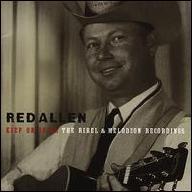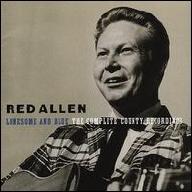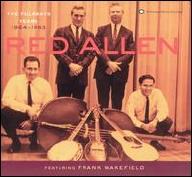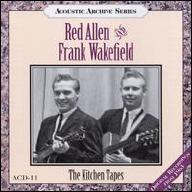In 1967, Allen moved to Nashville to relieve a temporarily ailing Lester Flatt in Flatt Scruggs. The next year he and J.D. Crowe founded the Kentucky Mountain Boys. In 1969, Allen went back to Dayton and formed a band with his sons known as Red Allen the Allen Brothers. With his boys, he found himself again on the Wheeling Jamboree, also recording for King Bluegrass and Lemco. The '70s brought international touring for Allen but little recording. In 1979, he issued another album for Smithsonian Folkways with the Kentuckians entitled Live and Let Live. In 1980, he issued a tribute to Lester Flatt titled In Memory of the Man, and followed that album with two more recordings for Folkways, 1981's Red Allen Family Friends and 1983's The Red Allen Tradition. Throughout the rest of the '80s and early '90s, Allen typically stayed a little closer to home, playing clubs and festivals near Dayton until his death from cancer in 1993. In 2001, Folkways issued The Folkways Years: 1964-1983, which was essentially a reissue of the 1964 Bluegrass album, plus six previously unreleased songs and a number of tracks from Allen's four other Folkways albums. The collection helped highlight some of the high points in Allen's long career, and showcased his remarkable talent as a bluegrass vocalist and guitarist. ~ Stacia Proefrock, Rovi
Red Allen
from Hazard, KY
February 12, 1930 - April 3, 1993 (age 63)
Biography
With a high lonesome sound heavily influenced by Bill and Charlie Monroe, Red Allen quietly took his place as one of the most talented and underrated bluegrass artists of the post-World War II era. Born in Perry County, KY, he later made his mark not far from there, first landing in Dayton, OH, at the age of 19 in 1949 after a two-year stint in the Marines. In Ohio, he became acquainted with several other musicians whom he would later collaborate with, including Frank Wakefield, the Osborne Brothers and Noah Crase. In 1954, he made his recording debut on an independent Kentucky label. In March 1956, he began an incredibly fruitful partnership with the Osborne Brothers, shortly after they had signed on with the Wheeling Jamboree, a popular radio show broadcast from the Virginia Theater in Wheeling, WV. Four months after he joined the group, they made their first recording with MGM Records, and built their audience over the next year by a steady program of touring and recording. In the spring of 1958, their song, Once More, hit number 13 on the country charts and helped earn the band a steady following. Allen left the Osborne Brothers at the end of 1958 and took a brief break from recording before moving to Washington, D.C., in 1959 and forming the Kentuckians with Wakefield. Their relationship was extremely fruitful creatively, but ultimately too tumultuous to sustain for long, and after producing a classic album in 1964 for Smithsonian Folkways simply titled Bluegrass, they parted ways.
Top Tracks
Albums
Videos
Close
















